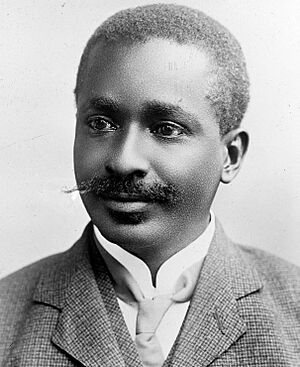Daniel Edward Howard facts for kids
Quick facts for kids
Daniel Edward Howard
|
|
|---|---|
 |
|
| 16th President of Liberia | |
| In office 1 January 1912 – 5 January 1920 |
|
| Vice President | Samuel George Harmon |
| Preceded by | Arthur Barclay |
| Succeeded by | Charles D.B. King |
| Personal details | |
| Born | 4 August 1861 Buchanan, Liberia |
| Died | 9 July 1935 (aged 73) Monrovia, Liberia |
| Political party | True Whig |
Daniel Edward Howard was an important leader in Liberia. He served as the 16th President of Liberia from 1912 to 1920. He was born on August 4, 1861, and passed away on July 9, 1935.
When World War I started, President Howard tried to keep Liberia out of the conflict. However, he generally supported the Allied powers. These were countries like France and Britain. Their lands in Africa were all around Liberia.
Germany protested when Howard let the French use a radio station in Liberia's capital, Monrovia. In 1917, Germany sent a submarine to attack Monrovia. This attack forced President Howard to join the Allies and declare war on Germany. He stayed in office for two years after the war ended.
Contents
Early Life and Career
Daniel Edward Howard was born in Buchanan. This town is in Grand Bassa County. His father, Thomas Howard, was a leader in the True Whig Party. He was also the Treasurer of Liberia.
Daniel Howard went to Liberia College for his education. He then started working for the government. He moved up through different jobs. Eventually, he became the Secretary of the True Whig Party. At that time, it was the only political party in Liberia. Before becoming president, he was the Secretary of the Treasury.
Becoming President (1912-1920)
Daniel Edward Howard became the President of Liberia in 1912. He served until 1920. During his time, Liberia's money situation was very difficult. Sometimes, government workers did not get paid for many months.
Challenges During His Presidency
President Howard faced several challenges during his time as leader. These included a local rebellion and the huge impact of World War I.
Kru People's Rebellion
In 1915, the Kru people living along the coast started a rebellion. They had often disagreed with the government in Monrovia. They said they were loyal to Great Britain. They even asked to become part of the Crown Colony of Sierra Leone.
To help stop the uprising, the United States sent a ship called the USS Chester. The ship was on its way home from Turkey. It was sent to Africa to help Liberia calm the rebellion.
Liberia and World War I
When World War I began, President Howard wanted Liberia to stay neutral. This meant not taking sides. However, he leaned towards supporting the Allies. The Allies were countries like Britain and France. Their colonies in Africa surrounded Liberia. Also, their strong navies made it hard for Liberia to trade with Germany.
Germany was Liberia's main trading partner. So, losing trade with Germany hurt Liberia's money a lot. The government lost a lot of money from taxes on goods. German submarines also blocked trade with the Allies. This made Liberia's money problems even worse.
Liberia's economy relied almost completely on money from exports. Because of this, President Howard had to ask the U.S. government for a loan. He needed $5 million. However, the United States Congress did not approve the loan.
Despite Germany's protests, President Howard let the French use a radio station in Monrovia. In 1917, Germany sent a submarine to attack the city. This attack forced President Howard to join the Allies. Liberia declared war on Germany on January 12, 1918.
After declaring war, Liberia took control of property owned by German citizens in Liberia. The money from this was put into the Liberian government's bank account. This helped make up for the money lost during the war. The war ended in 1918. Liberia's government then approved the Treaty of Versailles, which officially ended the war.
Land Disputes
In 1919, Liberia became a founding member of the League of Nations. This was an organization created to promote peace.
However, Liberia continued to have disagreements about its borders. This led to losing some land to Britain and France in 1919. When Britain and France seemed to want more land, U.S. warships would sometimes appear. This helped stop them from taking more of Liberia's territory. Even so, American leaders did not always give Liberia the strong support it asked for.
See also

